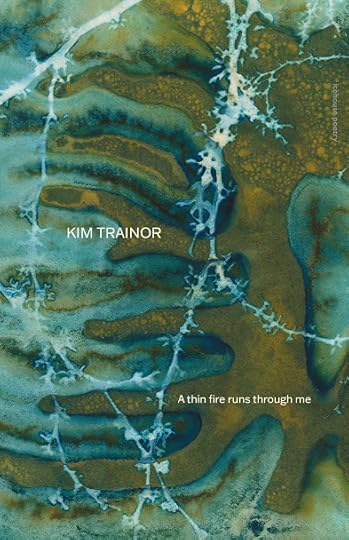Kim Trainor, A thin fire runs through me
And when you are gone I embalmyou
with words. Remove thetongue. Remove the eyes.
When they ask me aboutyou, I say I’ve moved on.
There’s this boy with anoud.
Always behind the barricades– no way in.
Your mouth a void.
So it was Hexagram 23after all. Stripping. Flaying. Splitting apart.
The typewriter cracksletters open. Splintered words.
My face is riddles withholes.
All night I was diggingat your grave. (“BLUEGRASS”)
Vancouver poet Kim Trainor’s third full-length poetry collection, after Karyotype(London ON: Brick Books, 2015) [see her ’12 or 20 questions’ interview from back then] and Ledi (Toronto ON: Book*hug 2018), is A thin fire runs through me (Fredericton NB: Icehouse poetry/Goose Lane Editions, 2023). As sheoffers in the book’s introduction:
A thin fire runs throughmebegan involuntarily, as a way of writing my way through a difficult time; thetitle poem functioned as a response to heartbreak, followed by depression, andeventually, the progression of new love. I wrote steadily over a period of aboutnine months, from late summer 2016 through the spring of 2017, roughly one poemevery two or three days, each poem a meditation on a different hexagram fromthe I Ching. The quotidian became interwoven with the political and the ecological.Through selection and juxtaposition of fragmented details, these hexagramsaimed to grapple with my own personal situation and to document the tenor ofthis time.
 Composedas a book of changes and responses, the structure of seeking external promptsis reminiscent of Kingston writer Diane Schoemperlen’s debut novel In theLanguage of Love (1994), a book composed via one hundred chapters, each onebased on one of the one hundred words in the Standard Word Association Test. WhereasSchoemperlen was attempting to prompt and progress her narrative, Trainor’spurposes are far more meditative, working from the opening poem sequence-section,“BLUEGRASS,” through a selection of numbered poems across cluster-sections “THEBOOK OF CHANGES” and “SONG OF SONGS.” Her poems are reactive and responsive,offering phrases, images and sentences as both clusters and layerings, accumulatingacross each particular meditation. As each poem progresses, she works from andthrough her immediate via a different prompt, from the endings of onerelationship and the beginnings of another, and all else that falls amid and in-between.“I wait until the marquee for you.” she writes, as part of poem “33.,” “Oursecond date. Cohen’s name in lights.” As the poem ends, further down: “As youstand next to me. In the red light of the Fox / there’s a tower of song.”
Composedas a book of changes and responses, the structure of seeking external promptsis reminiscent of Kingston writer Diane Schoemperlen’s debut novel In theLanguage of Love (1994), a book composed via one hundred chapters, each onebased on one of the one hundred words in the Standard Word Association Test. WhereasSchoemperlen was attempting to prompt and progress her narrative, Trainor’spurposes are far more meditative, working from the opening poem sequence-section,“BLUEGRASS,” through a selection of numbered poems across cluster-sections “THEBOOK OF CHANGES” and “SONG OF SONGS.” Her poems are reactive and responsive,offering phrases, images and sentences as both clusters and layerings, accumulatingacross each particular meditation. As each poem progresses, she works from andthrough her immediate via a different prompt, from the endings of onerelationship and the beginnings of another, and all else that falls amid and in-between.“I wait until the marquee for you.” she writes, as part of poem “33.,” “Oursecond date. Cohen’s name in lights.” As the poem ends, further down: “As youstand next to me. In the red light of the Fox / there’s a tower of song.”Thepoems included in the second and third sections, which make up the bulk of thecollection, are each numbered, but not set sequentially: nine followsfifty-two, which follows forty-nine, for example. As poem “60.,” set mid-pointin “THE BOOK OF CHANGES,” opens: “Jie. Articulating. / The joints thatdivide // a bamboo stalk. Spine. / Tongue. // Touch the edges of words – / Radicaltalk. Glottal. Stop.” Held together as a singular unit, the poems that make up Athin fire runs through me offer a collage of images and references fromthat particular period of compositional time, from bicycle wheels in Vancouver,sex and forms of the Sabbath to quotations by US President Donald Trump,displaying that era of upheaval and change through a sequence of meditative prompts.The poems aren’t working to seek order from the chaos, but are a record of herown processes of chaos, and her meditations through them. “And who will dietoday of fentanyl? / And who by law? // Inject the burning shot, / euphoriarushing. And then the dark.” (“21.”).
Thepoems saunter, casually, moving from moment to moment across a wide spectrum: “Ihave not seen you in five days.” poem “64.” offers, two-thirds through thesecond section. “When we meet / you tell me of all the creatures born at dusk,between worlds. // The frogs who are disappearing. / Their translucent skin. //Created at twilight on the eve of the Sabbath, / these defective creatureswho cleave neither above nor below.” As her introduction continues:
The quotidian offersus up minutiae – tweets, Instagrams, texts, social media posts, online news. Wepeer into other lives; we absorb words, headlines, violent events. We see andwe don’t see. These scraps are unintegrated, unintegrable, yet we carry them. Attimes, only poetry seems an adequate medium of response.
Afourth full-length collection, A blueprint for survival, is scheduled toappear with Guernica Editions in spring 2024.



